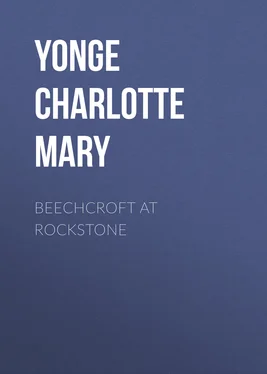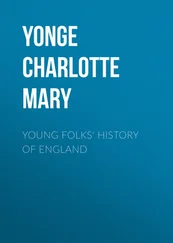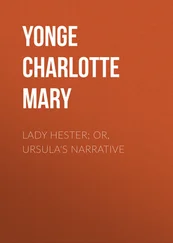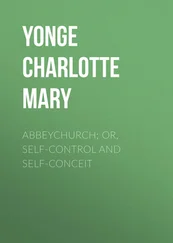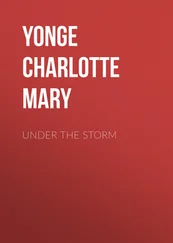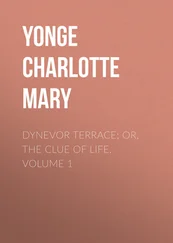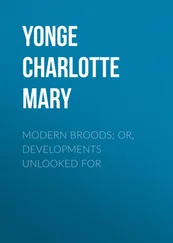Charlotte Yonge - Beechcroft at Rockstone
Здесь есть возможность читать онлайн «Charlotte Yonge - Beechcroft at Rockstone» — ознакомительный отрывок электронной книги совершенно бесплатно, а после прочтения отрывка купить полную версию. В некоторых случаях можно слушать аудио, скачать через торрент в формате fb2 и присутствует краткое содержание. Жанр: Альтернативная история, literature_19, Европейская старинная литература, foreign_antique, foreign_prose, Исторические приключения, на английском языке. Описание произведения, (предисловие) а так же отзывы посетителей доступны на портале библиотеки ЛибКат.
- Название:Beechcroft at Rockstone
- Автор:
- Жанр:
- Год:неизвестен
- ISBN:нет данных
- Рейтинг книги:4 / 5. Голосов: 1
-
Избранное:Добавить в избранное
- Отзывы:
-
Ваша оценка:
- 80
- 1
- 2
- 3
- 4
- 5
Beechcroft at Rockstone: краткое содержание, описание и аннотация
Предлагаем к чтению аннотацию, описание, краткое содержание или предисловие (зависит от того, что написал сам автор книги «Beechcroft at Rockstone»). Если вы не нашли необходимую информацию о книге — напишите в комментариях, мы постараемся отыскать её.
Beechcroft at Rockstone — читать онлайн ознакомительный отрывок
Ниже представлен текст книги, разбитый по страницам. Система сохранения места последней прочитанной страницы, позволяет с удобством читать онлайн бесплатно книгу «Beechcroft at Rockstone», без необходимости каждый раз заново искать на чём Вы остановились. Поставьте закладку, и сможете в любой момент перейти на страницу, на которой закончили чтение.
Интервал:
Закладка:
‘Or of my dear father’s death!’ said Kalliope, as Gillian stopped short, confused. ‘I did write to Miss Merrifield, but the letter was returned.’
‘But where did you write?’
‘To Swanage, where she had written to me last.’
‘Oh! we were only there for six weeks, while we were looking for houses; I suppose it was just as the Wardours were gone to Natal too?’
‘Yes, we knew they were out of reach.’
‘But do tell me about it, if you do not mind. My father will want to hear.’
Kalliope told all in a calm, matter-of-fact way, but with a strain of deep suppressed feeling. She was about twenty-three, a girl with a fine outline of features, beautiful dark eyes, and a clear brown skin, who would have been very handsome if she had looked better fed and less hardworked. Her Sunday dress showed wear and adaptation, but she was altogether ladylike, and even the fringe that had startled Aunt Ada only consisted of little wavy curls on the temples, increasing her classical look.
‘It was fever—at Leeds. My father was just going into a situation in the police that we had been waiting for ever so long, and there were good schools, and Richard had got into a lawyer’s office, when there began a terrible fever in our street—the drains were to blame, they said—and every one of us had it, except mother and Richard, who did not sleep at home. We lost poor little Mary first, and then papa seemed to be getting better; but he was anxious about expense, and there was no persuading him to take nourishment enough. I do believe it was that. And he had a relapse—and—’
‘Oh, poor Kalliope! And we never heard of it!’
‘I did feel broken down when the letter to Miss Merrifield came back,’ said Kalliope. ‘But my father had made me write to Mr. James White—not that we had any idea that he had grown so rich. He and my father were first cousins, sons of two brothers who were builders; but there was some dispute, and it ended by my father going away and enlisting. There was nobody nearer to him, and he never heard any more of his home; but when he was so ill, he thought he would like to be reconciled to “Jem,” as he said, so he made me write from his dictation. Such a beautiful letter it was, and he added a line at the end himself. Then at last, when it was almost too late, Mr. White answered. I believe it was a mere chance—or rather Providence—that he ever knew it was meant for him, but there were kind words enough to cheer up my father at the last. I believe then the clergyman wrote to him.’
‘Did not he come near you?’
‘No, I have never seen him; but there was a correspondence between him and Mr. Moore, the clergyman, and Richard, and he said he was willing to put us in the way of working for ourselves, if—if—we were not too proud.’
‘Then he did it in an unkind way,’ said Gillian.
‘I try to think he did not mean to be otherwise than good to us. I told Mr. Moore that I was not fit to be a governess, and I did not think they could get on without me at home, but that I could draw better than I would do anything else, and perhaps I might get Christmas cards to do, or something like that. Mr. Moore sent a card or two of my designing, and then Mr. White said he could find work for me in the mosaic department here; and something for my brothers, if we did not give ourselves airs. So we came.’
‘Not Richard?’ said Gillian, who remembered dimly that Richard had not been held in great esteem by her own brothers.
‘No; Richard is in a good situation, so it was settled that he should stay on there.’
‘And you—’
‘I am in the mosaic department. Oh, Miss Gillian, I am so grateful to Miss Merrifield. Don’t you remember her looking at my little attempts, and persuading Lady Merrifield to get mother to let me go to the School of Art? I began only as the girls do who are mere hands, and now I have to prepare all the designs for them, and have a nice little office of my own for it. Sometimes I get one of my own designs taken, and then I am paid extra.’
‘Then do you maintain them all?’
‘Oh no; we have lodgers, the organist and his wife,’ said Kalliope, laughing, ‘and Alexis is in the telegraph office, at the works; besides, it turned out that this house and two more belong to us, and we do very well when the tenants pay their rents.’
‘But Maura is not the youngest of you,’ said Gillian, who was rather hazy about the family.
‘No, there are the two little boys. We let them go to the National School for the present. It is a great trial to my poor mother, but they do learn well there, and we may be able to do something better for them by the time they are old enough for further education.’
Just then the sound of a bell coming up from the town below was a warning to both that the conversation must be broken off. A few words—‘I am so glad to have seen you,’ and ‘It has been such a pleasure’—passed, and then each hastened down her separate garden path.
‘Must I tell of this meeting?’ Gillian asked herself. ‘I shall write it all to mamma and Alethea, of course. How delightful that those lessons that Kalliope had have come to be of so much use! How pleased Alethea will be! Poor dear thing! How much she has gone through! But can there be any need to tell the aunts? Would it not just make Aunt Ada nervous about any one looking through her sweet and lovely wall? And as to Aunt Jane, I really don’t see that I am bound to gratify her passion for knowing everything. I am not accountable to her, but to my own mother. My people know all about Kalliope, and she is prejudiced. Why should I be unkind and neglectful of an old fellow-soldier’s family, because she cannot or will not understand what they really are? It would not be the slightest use to tell her the real story. Mrs. White is fat, and Kalliope has a fringe, goes to St. Kenelm’s, and won’t be in the G.F.S., and that’s enough to make her say she does not believe a word of it, or else to make it a fresh ground for poking and prying, in the way that drives one distracted! It really is quite a satis-faction to have something that she can’t find out, and it is not underhand while I write every word of it to mamma.’
So Gillian made her conscience easy, and she did write a long and full account of the Whites and their troubles, and of her conversation with Kalliope.
In the course of that week Fergus had a holiday, asked for by some good-natured visitor of Mrs. Edgar’s. He rushed home on the previous day with the news, to claim Aunt Jane’s promise; and she undertook so to arrange matters as to be ready to go with him to the marble works at three o’clock. Valetta could not go, as she had her music lesson at that time, and she did not regret it, for she had an idea that blasting with powder or dynamite was always going on there. Gillian was not quite happy about the dynamite, but she did not like to forego the chance of seeing what the work of Kalliope and Alexis really was, so she expressed her willingness to join the party, and in the meantime did her best to prevent Aunt Ada from being driven distracted by Fergus’s impatience, which began at half-past two.
Miss Mohun had darted out as soon as dinner was over, and he was quite certain some horrible cad would detain her till four o’clock, and then going would be of no use. Nevertheless he was miserable till Gillian had put on her hat, and then she could do nothing that would content him and keep him out of Aunt Ada’s way, but walk him up and down in the little front court with the copper beeches, while she thought they must present to the neighbours a lively tableau of a couple of leopards in a cage.
However, precisely as the clock struck three, Aunt Jane walked up to the iron gate. She had secured an order from Mr. Stebbing, the managing partner, without which they would not have penetrated beyond the gate where ‘No admittance except on business’ was painted.
Читать дальшеИнтервал:
Закладка:
Похожие книги на «Beechcroft at Rockstone»
Представляем Вашему вниманию похожие книги на «Beechcroft at Rockstone» списком для выбора. Мы отобрали схожую по названию и смыслу литературу в надежде предоставить читателям больше вариантов отыскать новые, интересные, ещё непрочитанные произведения.
Обсуждение, отзывы о книге «Beechcroft at Rockstone» и просто собственные мнения читателей. Оставьте ваши комментарии, напишите, что Вы думаете о произведении, его смысле или главных героях. Укажите что конкретно понравилось, а что нет, и почему Вы так считаете.
